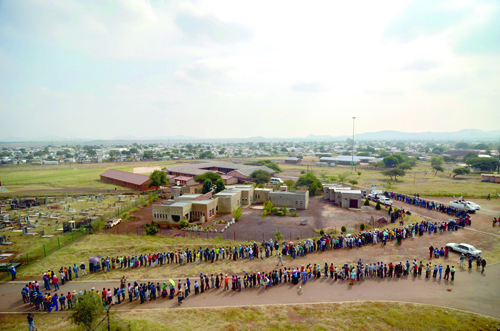|

South Africans line up to vote
On May 7, South Africans went to the polls in throngs to exercise their constitutional right to vote. In a country where the majority of the population was once excluded from casting their votes and from participating in the political decision making process, elections are an integral part of democracy for large parts of society.
Twenty years into South Africa’s hard-fought-for democracy, the country continues to struggle with overcoming the legacy of apartheid, and achieving the required economic growth necessary to boost employment and reduce poverty and inequality. While the country has made great strides in increasing the number of people with access to basic services such as electricity and sanitation, too many people still depend on social grants to get by. For many, this is not enough, and disenfranchised communities regularly air their frustration through often violent service delivery protests.
In traditional feisty electioneering campaigning, each party contesting for votes was quick to promise jobs, better services and a better life. Most analysts and economists, and even to some extent the political parties themselves, seem to agree that the government alone is not able to provide jobs. That task requires a concerted effort of the nation. Jobs did however emerge as the key selling point to the electorate.
Expected victory
As expected, the African National Congress (ANC) - the ruling party since 1994 - was victorious at the polls with 62.15 percent of the votes, followed by the official opposition Democratic Alliance (DA) which won 22.23 percent of the votes. This is a slight decline for the ANC, which secured 65.9 percent in the 2009 elections. In Gauteng Province, South Africa’s economic heartland, the decline of the ruling party was even more pronounced; here the ANC declined from 64 percent to under 55 percent.
While the outcome of the election and the victory of the ANC did not come as a surprise, a number of political commentators are viewing the slight weakening of the ANC support as an indication of the populous being disappointed by the economic performance of the country and the service delivery of the national government. Against this backdrop, the question of whether the ANC is likely to change its economic policy path is often put forward. The answer to this question is most likely no. Few expect a major change in the economic policy direction of the ANC. And to be honest, why would they? Winning with such a convincing margin provides any party with little or no incentives to distract from its current economic policy path.
National Development Plan
Indeed, it could be considered that a major positive of the ANC retaining its place is the stability it brings to economic planning through the National Development Plan (NDP) - the growth plan which was devised and adopted by the ruling party in 2010. It provides a blueprint for the country’s economic growth over the next 20 years, encouraging increased private sector investment in infrastructure projects, with the energy sector - where capacity deficits have hamstrung the economy since 2008 - set to derive the greatest benefit.
Specifically, it advocates that 10 percent of GDP is to be spent on infrastructure investment, including improvements to power generation and supply, public transport and telecommunications.
However, while the ANC is in a comfortable situation in terms of support by the majority of the voting public, the ruling party has come under increased pressure from their traditional allies for supporting this plan. This pressure has been applied from the quarters of the Congress of South African Trade Unions (COSATU) affiliates.
The South African Municipal Workers Union, the Food & Alliance Workers Union and, most vocally, the National Union of Metal Workers of South African (NUMSA) have denounced the plan - the latter, having stated it is based on DA policies and “neoliberalism.”
However, it is exactly for the reason of the ANC government’s close alliance with the trade unions that the country’s economic growth has deteriorated. Having produced a rigid labor system - one of the banes to foreign investors operating in the country - South Africa has seen significant losses in foreign direct investment (FDI), proving the system to be one of the biggest inhibitors to promoting long-term economic growth.
It is expected that the government will throw its full weight behind the NDP.
Beyond this, the government also needs to ensure that it resolves the four-month-old platinum sector strike. Over the short term, an upward movement in strike action can be expected and may continue due to the labor turbulences from events such as the violent wildcat strike by mine workers in August 2012 at Marikana, Lonmin mine, which left 44 people dead and scores injured.
If the government fails to address South Africa’s key challenges of poverty, unemployment and inequality - sometimes dubbed the “unholy trinity” - the ANC is running the risk of losing further support by an increasingly impatient electorate when South Africans go back to the polls in 2019. CA
(John de Villiers is an analyst at Frontier Advisory, Simon Schaefer is a senior analyst at Frontier Advisory)
|